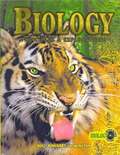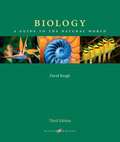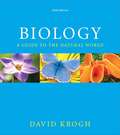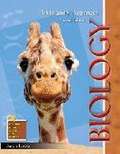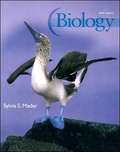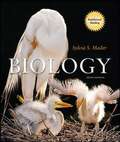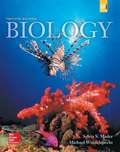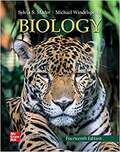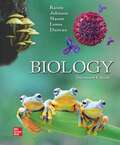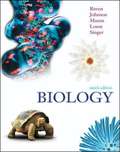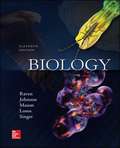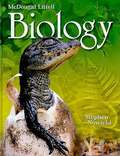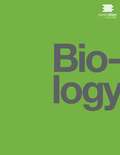- Table View
- List View
Biology: Principles and Explorations
by George B. Johnson Peter H. RavenPart 1 of this book deals with principles containing topics on Principles, Principles of Cell Biology, Principles of Genetics, Principles of Evolution and Principles of Ecology, and part 2 deals with Explorations containing Exploring Diversity, Exploring Plants, Exploring Invertebrates, Exploring Vertebrates and Exploring Human Biology.
Biology: A Guide to the Natural World (3rd edition)
by David KroghA book students enjoy reading, this was written and illustrated to guide non-majors through biological concepts and develop their sense of scientific literacy.
Biology: A Guide to the Natural World (5th Edition)
by David KroghDavid Krogh's Biology: A Guide to the Natural World leads readers on a memorable journey through the world of biology, using relevant examples, clearly-developed illustrations, and helpful insights that resonate with today's students. Widely-recognized as a book that students enjoy reading, the Fifth Edition has been thoroughly updated with new discussions on social concerns and health applications, along with streamlined chapter summaries and expanded review questions.
Biology: The Living Science
by Joseph S. Levine Kenneth R. MillerThe authors of Biology the Living Science wrote this book to inform, and maybe even to inspire, you about the living science of biology.
Biology
by Sylvia S. MaderBiologyis a comprehensive introductory biology textbook that covers biology in a traditional order, from the structure and function of the cell to the organization of the biosphere. The book centers on the evolution and diversity of organisms. It’s no wonder that Sylvia Mader’sBiologycontinues to be a text that’s appreciated as much by teachers as it is by the students who use it. The tenth edition is the epitome of Mader’s expertise: Its concise, precise writing uses an economy of words to present the material as succinctly and clearly as possible, thereby enabling students to understand the concepts without necessarily asking the teacher to explain further. AP Correlation Visit the Online Learning Center Request an Examination Copy
Biology: Student Study Guide (Ninth Edition)
by Sylvia S. MaderThe Study Guide is designed to accompany your text, Biology, ninth edition, by Sylvia S. Mader. A number of different approaches are used to help you achieve mastery of the chapter concepts.
Biology
by Sylvia S. Mader Murray P. PendarvisBiology is now a tightly knit text that covers the concepts and principles of biology from the structure and function of the cell to the organization of the biosphere. It draws upon the entire world of living things to bring out an evolutionary theme that is introduced from the start. The concept of evolution is necessary to understanding the unity and diversity of life, and serves as a background for the study of ecological principles. Modern ecological problems, including the biodiversity crisis, are stressed throughout the text.
Biology
by Sylvia S. Mader Michael WindelspechtTHE MADER/WINDELSPECHT STORY. . . The twelfth edition of Biology is a traditional, comprehensive introductory biology textbook, with coverage from Cell Structure and Function to the Conservation of Biodiversity. The book, which centers on the evolution and diversity of organisms, is appropriate for any one- or two-semester biology course. Biology, 12th Edition is the epitome of Sylvia Mader's expertise. Its concise, precise writing-style employs lucid language to present the material as succinctly as possible, enabling students--even non-majors--to master the foundational concepts before coming to class. "Before You Begin", "Following the Themes", and "Thematic Feature Readings" piece together the three major themes of the text--evolution, nature of science, and biological systems. Students are consistently engaged in these themes, revealing the interconnectedness of the major topics in biology. Sylvia Mader typifies an icon of science education. Her dedication to her students, coupled with her clear, concise writing-style has benefited the education of thousands of students over the past three decades. The integration of the text and digital world has been achieved with the addition of Dr. Michael Windelspecht's facility for the development of digital learning assets. For over ten years, Michael served as the Introductory Biology Coordinator at Appalachian State University--a program that enrolls over 4,500 non-science majors annually. Michael is the lead architect in the design of McGraw-Hill's Connect Plus and LearnSmart media content for the Mader series. These assets allow instructors to easily design interactive tutorial materials, enhance presentations in both online and traditional environments, and assess the learning objectives and outcomes of the course.
Biology
by Sylvia S. Mader Michael WindelspechtMader includes revised coverage of animal behaviour and ecology as well as a wealth of new focus boxes which highlight topics of high interest and relate biology to everyday life.
Biology
by Sylvia S. Mader Michael WindelspechtBiology is a traditional, comprehensive introductory biology textbook, with coverage from cell structure and function to the conservation of biodiversity. The book, which centers on the evolution and diversity of organisms, is appropriate for any one-or two-semester biology course. Biology uses concise, precise writing to present the material as succinctly as possible, enabling students--even non-majors--to master the foundational concepts before coming to class.
Biology
by Kenneth A. Mason Jonathan B. Losos Tod DuncanThe Raven & Johnson's Biology author team is committed to continually improving the text, keeping the student and learning foremost. The integrated pedagogical features expand the students' learning process and enhance their learning experience. This latest edition of the text maintains the clear, accessible, and engaging writing style of past editions with the solid framework of pedagogy that highlights an emphasis on evolution and scientific inquiry that have made this a leading textbook for students majoring in biology. This emphasis on the organizing power of evolution is combined with an integration of the importance of cellular, molecular biology and genomics to offer our readers a text that is student friendly and current. <p><p>Additionally, with McGraw Hill Connect, powerful digital tools augment instruction by helping students think more critically, develop quantitative and graphing skills and apply their knowledge in a laboratory setting. Connect Virtual Labs can be implemented in a hybrid or fully online setting to help students prepare for the wet lab and strengthening their lab experience.
Biology
by Kenneth A. Mason Jonathan B. Losos Susan R. SingerCommitted to Advanced Placement Biology! Committed to Students New pedagogical features to guide student learning Each chapter begins with an outline of the chapter. Learning outcomes are included for every major topic to help students see the forest for the trees and focus on the main concepts and relationships of the details being presented to them. Scientific Thinking illustrations are highlighted and provide students with questions, as well as a hypothesis, prediction, observation, experiment, etc. , as appropriate to guide their thought process and teach them to think like a scientist. Inquiry questions are found throughout the text to push the students further in their ability to think scientifically. Learning outcomes are revisited with a short review prior to moving on to the next major topic. A logically organized summary is available at the end of each chapter for students to use as a quick study tool. End of chapter review questions include Understanding, Applying and Synthesizing levels. Committed to Biology Teachers The dynamic author team comprised of Jonathan Losos, Evolutionary Biologist at Harvard University, Ken Mason, Molecular Biologist at University of Iowa, and Susan Singer, Plant Geneticist, Carleton College, have joined forces to move this high-quality textbook forward in a significant way for a new generation of students. All three authors have extensive experience teaching undergraduate biology and have used this knowledge as a guide in producing a text that is up-to-date, beautifully illustrated, and pedagogically sound for the student. They have provided clear, explicit learning objectives, and more closely integrate the text with its media support materials to provide instructors with an excellent complement to their teaching. Committed to Today’s Learning EnvironmentConnect™ High School Study Center Enhanced Image and Lecture PPt New Animations Active Learning Exercises Learn Engaging, Interactive Questions and Activities Student Self Study Succeed Enhanced Testbank Powerful Diagnostics and Reports for Students and Instructors Connect Plus eBook Request an Examination Copy Visit the Online Learning Center
Biology
by Kenneth A. Mason Jonathan B. Losos Susan R. Singer Peter H. RavenCommitted to Excellence in the Eleventh Edition. This edition continues the evolution of Raven & Johnson's Biology. The author team is committed to continually improving the text, keeping the student and learning foremost. The integrated pedagogical features expand the students' learning process and enhance their learning experience. This latest edition of the text maintains the clear, accessible, and engaging writing style of past editions with the solid framework of pedagogy that highlights an emphasis on evolution and scientific inquiry that have made this a leading textbook for students majoring in biology. This emphasis on the organizing power of evolution is combined with an integration of the importance of cellular, molecular biology and genomics to offer our readers a text that is student friendly and current. Our author team is committed to producing the best possible text for both student and faculty. The lead author, Kenneth Mason, University of Iowa, has taught majors biology at three different major public universities for more than fifteen years. Jonathan Losos, Harvard University, is at the cutting edge of evolutionary biology research, and Susan Singer, Carleton College, has been involved in science education policy issues on a national level. All three authors bring varied instructional and content expertise to this edition of Biology.
Biology: The Dynamics of Life (Texas edition)
by McGraw-HillBiology Dynamics of Life prepares students for the 10th and 11th grade exams.
Biology
by Kenneth R. Miller Joseph S. LevineYou are about to enter a wonderfully exciting, and sometimes unbelievable, world--the world of living things. In the pages of this textbook you will come to understand the nature of life as we know it today. You will also gain an appreciation of the scientific process that has resulted in the body of knowledge we know as biology.
Biology: Lab Manual B (Grade 9/10)
by Levine MillerThe respected author team of Ken Miller and Joe Levine are back with a new edition of biology books to inspire students to interact with trusted and up-to-date biology content. The authors' unique storytelling style engages students in biology, with a greater focus on written and visual analogies.
Biology
by Stephen Nowicki"The 21st century will be the century of biological science, just as the 20th century was the century of physical science," predicts Professor Stephen Nowicki, an award-winning teacher at Duke University. Dr. Nowicki has adapted his acclaimed introductory biology course for The Teaching Company to bring you up to date on one of the most important fields of knowledge of our time and help you appreciate the marvelous diversity and complexity of life. You will obtain the background and guidance to explore in depth the fundamental principles of how living things work-principles such as evolution by natural selection, the cellular structure of organisms, the DNA theory of inheritance, and much more. This challenging course is organized around three major themes: "Information and Evolution," "Development and Homeostasis," and "Energy and Resources. " You will explore living systems at all levels, from biological molecules to global ecosystems. You will gain insight into pressing issues facing society, including genetic modification and cloning, stem-cell research, AIDS, the depletion of the rainforests, and global warming. You will discover mechanisms behind such intriguing phenomena as why children resemble their parents, why plants bend toward light, how memories are stored, why some birds have very long tails, and how life itself began on Earth. Above all, you will learn how to think about biology, so that in your day-to-day life you will understand the significance and complexities of news stories, medical issues, and public debates, not to mention what is going on in your own garden and in nature all around you.
Biology
by Stephen Nowicki"The 21st century will be the century of biological science, just as the 20th century was the century of physical science," predicts Professor Stephen Nowicki, an award-winning teacher at Duke University. Dr. Nowicki has adapted his acclaimed introductory biology course for The Teaching Company to bring you up to date on one of the most important fields of knowledge of our time and help you appreciate the marvelous diversity and complexity of life. You will obtain the background and guidance to explore in depth the fundamental principles of how living things work-principles such as evolution by natural selection, the cellular structure of organisms, the DNA theory of inheritance, and much more. This challenging course is organized around three major themes: "Information and Evolution," "Development and Homeostasis," and "Energy and Resources." You will explore living systems at all levels, from biological molecules to global ecosystems. You will gain insight into pressing issues facing society, including genetic modification and cloning, stem-cell research, AIDS, the depletion of the rainforests, and global warming. You will discover mechanisms behind such intriguing phenomena as why children resemble their parents, why plants bend toward light, how memories are stored, why some birds have very long tails, and how life itself began on Earth. Above all, you will learn how to think about biology, so that in your day-to-day life you will understand the significance and complexities of news stories, medical issues, and public debates, not to mention what is going on in your own garden and in nature all around you.
Biology
by OpenStaxBiology is designed for multi-semester biology courses for science majors. It is grounded on an evolutionary basis and includes exciting features that highlight careers in the biological sciences and everyday applications of the concepts at hand. To meet the needs of today's instructors and students, some content has been strategically condensed while maintaining the overall scope and coverage of traditional texts for this course. Instructors can customize the book, adapting it to the approach that works best in their classroom. Biology also includes an innovative art program that incorporates critical thinking and clicker questions to help students understand--and apply--key concepts.
